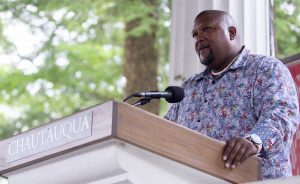
What does it mean to be anointed by God?” the Rev. David Anderson asked the congregation at the 9:15 a.m. Tuesday Ecumenical Service in the Amphitheater. “And what kinds of people does God anoint to do the work of ministry?”
Anderson’s sermon title was “The Power of ‘Anointing,’ ” and the Scripture text was 1 Timothy 1:12-17.
Paul, in his letter to Timothy, told him not to let people look down on him because he was young.
“Paul told Timothy not to fear to do his ministry because he was young,” Anderson said. “You fill in that blank. We say to ourselves ‘God could not use me because I am ____.’ ”
But, Anderson said, “you are appointed and anointed.”
“Paul, in these verses in Timothy, is telling his story,” he said. “He was a blasphemer, a persecutor and a violent man. I can hear Paul saying, ‘I was messed up but God appointed me to do his service.’ ”
We all have fill-in-the-blank moments, Anderson told the congregation, when we ask, “Why did God call me?” Paul was humbled to be called and because of God’s mercy, grace and patience, God could actually use Paul in ministry.
“Is there anyone here who knows God’s mercy?” Anderson asked. People in the congregation responded with an “amen” or raising their hands. “Anyone who knows God’s grace, God’s patience? We owe God a debt of gratitude for the grace we have been given that we did not deserve.”
Paul said he was appointed to serve God. The Greek word used here, themenos, means that someone is set in place to serve, not ordered to serve.
“It is like God put his thumbprint on Paul and designed him for the service to which he was appointed,” Anderson said.
Paul was an unlikely choice to be an apostle, Anderson said, but “the design does not have to make sense to anyone but the designer.”
“You have been thumbprinted by God; you are uniquely different from any other person,” he told the congregation. “You have not been ordered to serve but designed and arranged and ordained by God who is designing your story to serve him and his servants. You are uniquely qualified to be you; you have no need to be jealous of other people’s talents.”
If your service is your purpose, then your strength is your power.
“If appointing gives you purpose, anointing gives you power,” he said to the congregation. “God will give you the power if you have a purpose.”
Anderson shared some of the faith journey he also described at the 5 p.m. Sunday Vespers in the Hall of Philosophy.
“When I was 18, I decided that I could not ride on the faith of my mother’s ‘amens’ or my preacher father’s ‘hallelujahs,’ ” he said. “I was having a good time but I had no purpose. I prayed in the car to give my life to Jesus to find my purpose.”
Anderson believes that everyone, whether rich or poor, black, white, Asian or Latino, is in need of salvation, in need of the power and peace of God. He also believes he was called to build a multiracial church.
He asked his roommate, Brent Zuercher to “be the money guy” in building a multiracial church. Zuercher told him he was not interested. He said, “I am cool with you but not with your people.” Anderson asked Zuercher to write to him and explain his issues with black people.
“I found that Brent was at an elementary level of investigating, and I was at a graduate level of living,” Anderson said.
Their correspondence became the 2001 book, Letters Across the Divide: Two Friends Explore Racism, Friendship, and Faith.
God is not only into those who have it all together, Anderson said, but can use people who don’t have it all together.
He closed with a story of a servant who went down to a creek every day to get water with two pots balanced on his shoulders. By the time he got home every day one pot was full, but one was only half full.
The older, cracked pot said to the servant, “It is time to retire me.” The servant said, “Actually, you do have a purpose, and I will show you tomorrow.”
The next day, as they came back from the creek, the servant said, “Look at the side of the road.” On the side where the cracked pot was carried, were flowers. The servant said, “I throw seeds there, and the water falls on them so the master can see the beautiful flowers.”
“You are not too old, not too broken to still serve,” Anderson said. “All you creatively cracked pots for Christ are appointed and anointed by God. Let all Chautauqua say ‘amen.’ ”
Anna Grace Glaize, Christian coordinator for the Abrahmic Program for Young Adults, presided. Katalin Nagy, a scholarship student with the International Order of the King’s Daughters and Sons from Ukraine, read the Scriptures in Ukrainian and English. She studies English language literature at the Ferenc Rákóczi II Transcarpathian Hungarian College. The Motet Choir sang “Choose Something Like a Star” by Randall Thompson, with words from a poem by Robert Frost. Jared Jacobsen, organist and coordinator of worship and sacred music, directed the choir. The Mr. and Mrs. William Uhler Follansbee Memorial Chaplaincy and the Jackson-Carnahan Memorial Chaplaincy provide support for this week’s services.




